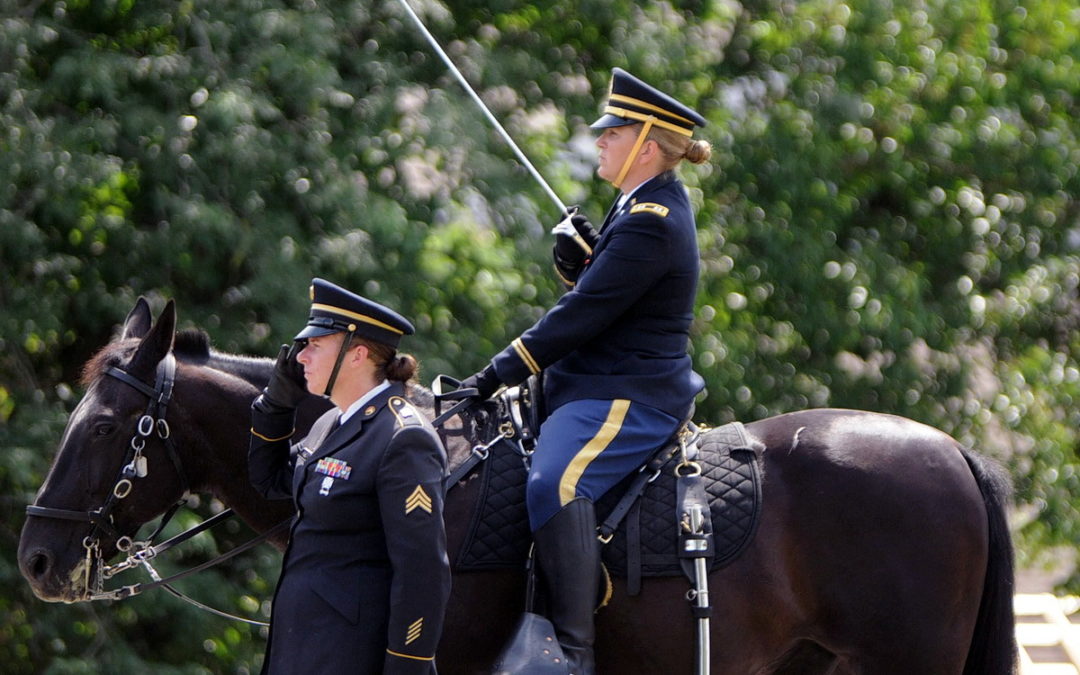So many former racehorses, both thoroughbred and Standardbred, face an uncertain–and possibly unhappy–fate when they leave the track. Although there are groups geared to finding new jobs and/or new homes for them (the Standardbred Retirement Foundation and the Thoroughbred Aftercare Alliance come to mind), many still fall through the cracks.
But Re-Elect is a lucky one with owners who cared about him–even after he spent 16 years away from them. Maggi Romano and her husband, Tony, who own a farm in the Clarksburg section of Millstone, Monmouth County, bought the black Standardbred gelding by New Jersey stallion Presidential Ball when he was three. He started racing for them at Freehold, and Maggi recalled how her friends all loved the horse with personality that she called Re-Re.
He went on to compete at Yonkers, Monticello and Colonial Downs in Virginia before things went wrong. In 2001, Maggi sent him to a farm so he could be refreshed from his work at the track, but against her wishes, the owners turned him out with other horses.
“They chased him overnight and he ran through the fence, cutting his tendon,” she said. Maggi realized the injury meant an end to his racing career, so she sought an alternative job for him when his tendon healed after a stay in New Jersey.
“I heard the Army uses black horses for their funerals and that a Standardbred who raced at Freehold was with the Caisson Platoon at the Arlington National Cemetery (the former trotter was Sgt. York, the riderless horse at President Reagan’s funeral). They had no openings, but someone put us in touch with the Indiana National Guard.”
That worked. Their horse was approved by the Military Department of the Indiana Ceremonial Unit that provides military honors at funeral services for active or retired members of the Indiana National Guard.
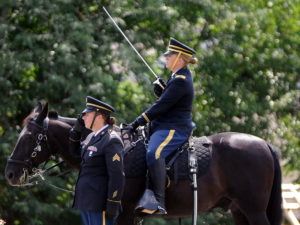
Reed on duty as an outrider’s horse with Chaplain Martha Lasher in the saddle and Sgt. Megan Mason standing by. (Photo courtesy Indiana National Guard)
“We set up an adoption contract, in case it wasn’t working out or they didn’t need him anymore,” said Maggi, the former president of the New Jersey Horse Council and chairman of the state Equine Advisory Board.
The Guard gave him his military name, Reed; picked him up and took him to the Midwest. And that seemed to be that.
“I tried to stay in touch, and my husband went to see him at their barn and at a parade,” Maggi noted.
“But his handlers were called for active combat overseas, and he was shuffled to different handlers and barns,” she said. “I thought of him and looked at his picture sometimes, but didn’t think I would see him again.”
Then, this August, events began moving toward having Re-Re, aka Reed, back in her life.
“I received an email from Chaplain (Martha) Lasher of the Indiana National Guard Ceremonial Unit,” explained Maggi.
The chaplain, who had only been with the unit for 18 months, found a file on Reed that included the adoption contract. It was providential, since the horse was ready to retire from his military duties at the age of 23. The chaplain just hoped Maggi still could be reached at the email address in the file.
“According to the contract, I had to be contacted if they should find a retirement home in Indiana or if I would like to have him back,” said Maggi, who was speechless when she got the email. She forwarded the notification to her husband, “and he voted to take him back.”
The chaplain explained to Maggi what Reed had been doing, noting that not everybody gets a horse at their funeral. The honor is reserved for those with the rank of sergeant major, chief warrant officers, colonels and generals, as well as governors and senators. The unit did not keep complete records, but there was enough available to know that Reed participated in more than 90 funerals, where draft horses pulled the caissons. Reed functioned either as an outrider’s horse or as the CAP horse (caparisoned in ornamental trappings with an empty saddle). This is the riderless horse that (like Sgt. York) walks behind the casket with a sabre, empty saddle and empty boots turned backwards in the stirrups, symbolic of a fallen warrior.
He also was in many parades and public events, in the color guard carrying the flag, in addition to numerous exhibitions and outreach events of the Caisson Platoon/Ceremonial Unit. Reed, who had been given the rank of Sergeant First Class, would meet and greet the public and let them touch him, a way for them to get a glimpse into the life of a military horse.
Rick Tarr, a retired first sergeant who is involved with care of horses in the Indiana unit (his wife, Shelley, a retired E-4 specialist is the stable manager), was very fond of Reed. He cited the horse’s playfulness, “he’d steal a glove right out of your pocket.”
A volunteer who also trains riders and horses, Rick noted that Reed “was at almost every event,” which included as many as 15 to 20 parades a year. Asked what he looks for in a potential addition to the unit’s eight-horse string, Rick said “their demeanor,” and Reed filled that bill admirably until his retirement.
Rick, who had been the non-commissioned officer in charge of the stable, called Reed “outstanding,” noting how well he stood at ceremonies. If he ever got a little restless, it only took a small circle and a chorus of “You Are My Sunshine” from one of the soldiers to get him back in the groove and standing still.
The pieces began falling into place for Reed’s return to the Romanos when the chaplain explained she was coming to New Jersey for a family event at the end of September and could bring the horse to Clarksburg.
But before that, there was an official retirement for Reed and his stablemate, Midnight, a Percheron who had served for 19 years and was being adopted by a Gold Star Mother. She planned to ride him and incorporate him in her therapy program for veterans.
The Romanos were invited to the Sept. 9 ceremony. Maggi started driving to Indiana Sept. 8, “making sure I would not miss any of it.” A reception was set for noon the next day, but she got permission to come at 11 and arrived a half-hour early, full of anticipation.
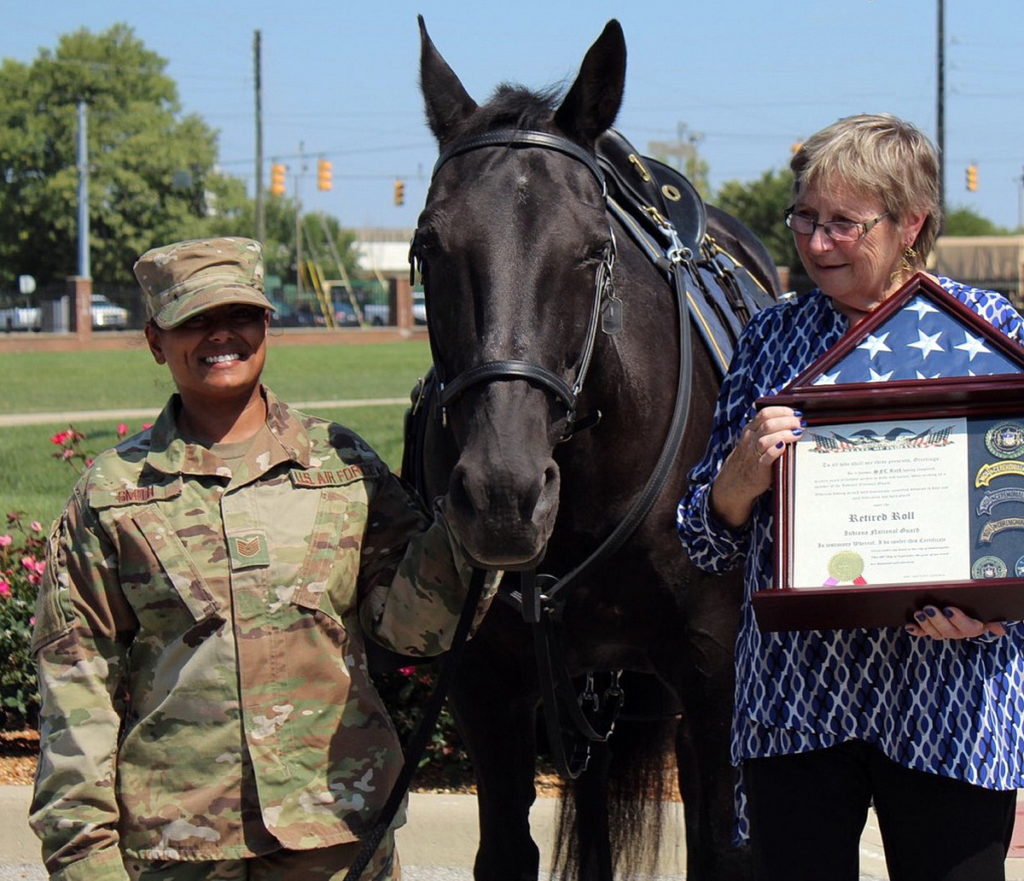
Maggi and Reed at his retirement ceremony. (Photo courtesy Indiana National Guard)
When meeting members of the military at the ceremony, “I wanted to thank them for their service,” she said, “but they were thanking me for sending him (Reed) to them, letting him be part of their unit for so many years and now being willing to take him back to his forever home.”
It would be nice to say that Reed whinnied and rushed over to see Maggi when they were reunited, but it had been 16 years and let’s face it, a horse often has different priorities than a human–even when the cameras are on him.
“I hugged him,” Maggi said, “but he wasn’t interested. He wanted to eat grass.”
During the ceremony, Chaplain Lasher described the backgrounds of Reed and Midnight, talking about their years of service. Their replacements also were part of the ceremony.
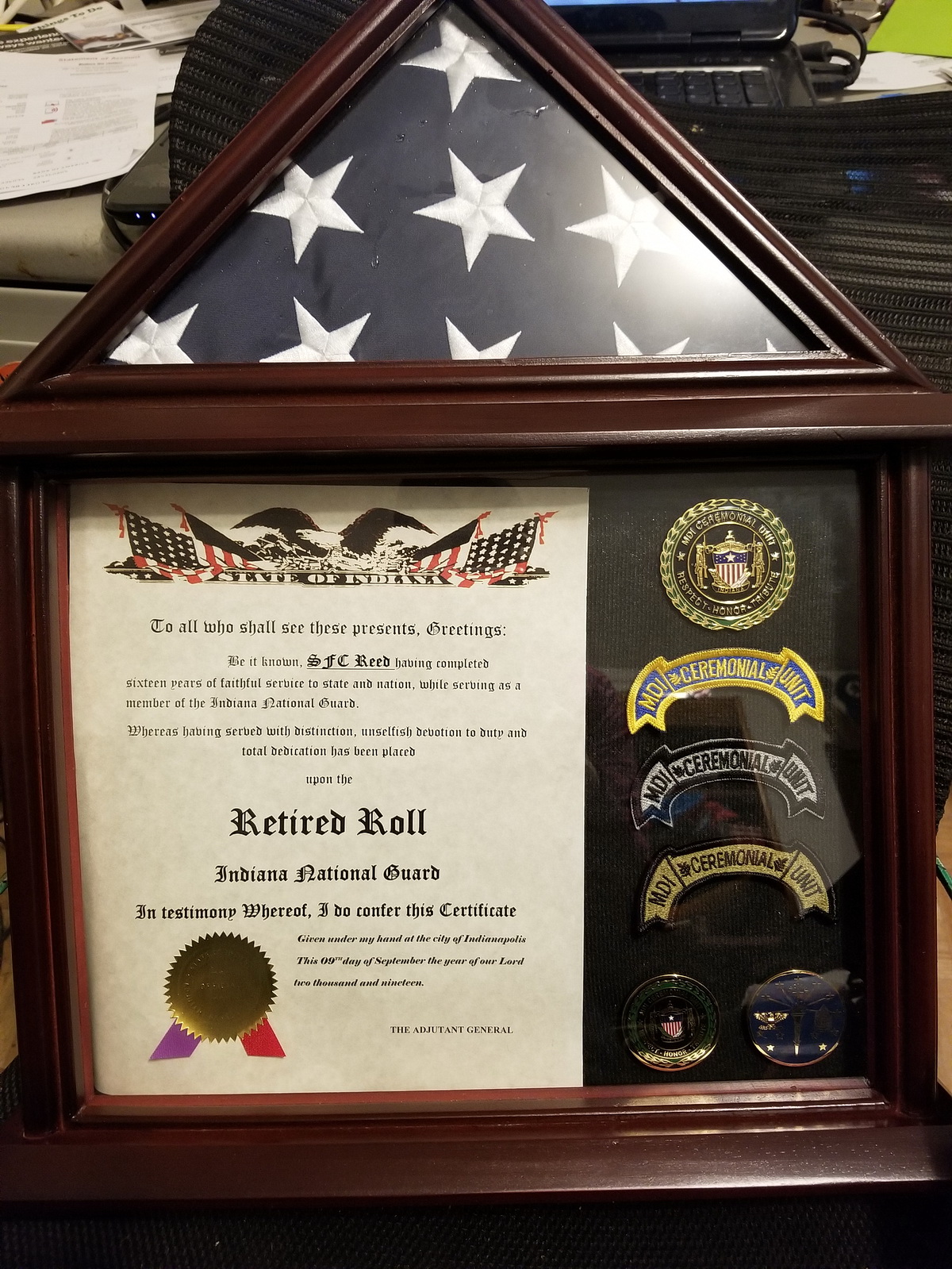
“Sgt. Amber Brown took the sabres that had been used with the two retiring horses and presented them to the two new horses,” said Maggi.
“We all lined up with the horses and the Adjutant General presented Midnight’s new owner and me with a picture box with the folded flag, his badges and a script: “Be it known, SFC Reed having completed 16 years of faithful service to state and nation, while serving as a member of the Indiana National Guard. Whereas having served with distinction, unselfish devotion to duty and total dedication has been placed upon the RETIRED Roll, Indiana National Guard.”
Then Reed was shipping to New Jersey in a big trailer with the official seal of the MDI Ceremonial Unit.
However, as Maggi observed, “Many Standardbreds don’t like retired life. He was lost the first few days at my farm. He missed his friends and the daily routine. The military horses in Indiana were ridden and driven by their handlers every week, even if there were no events. He had looked out for his stablemates at the farm in Indiana and felt like the protector of even the 18-hands Percherons.”
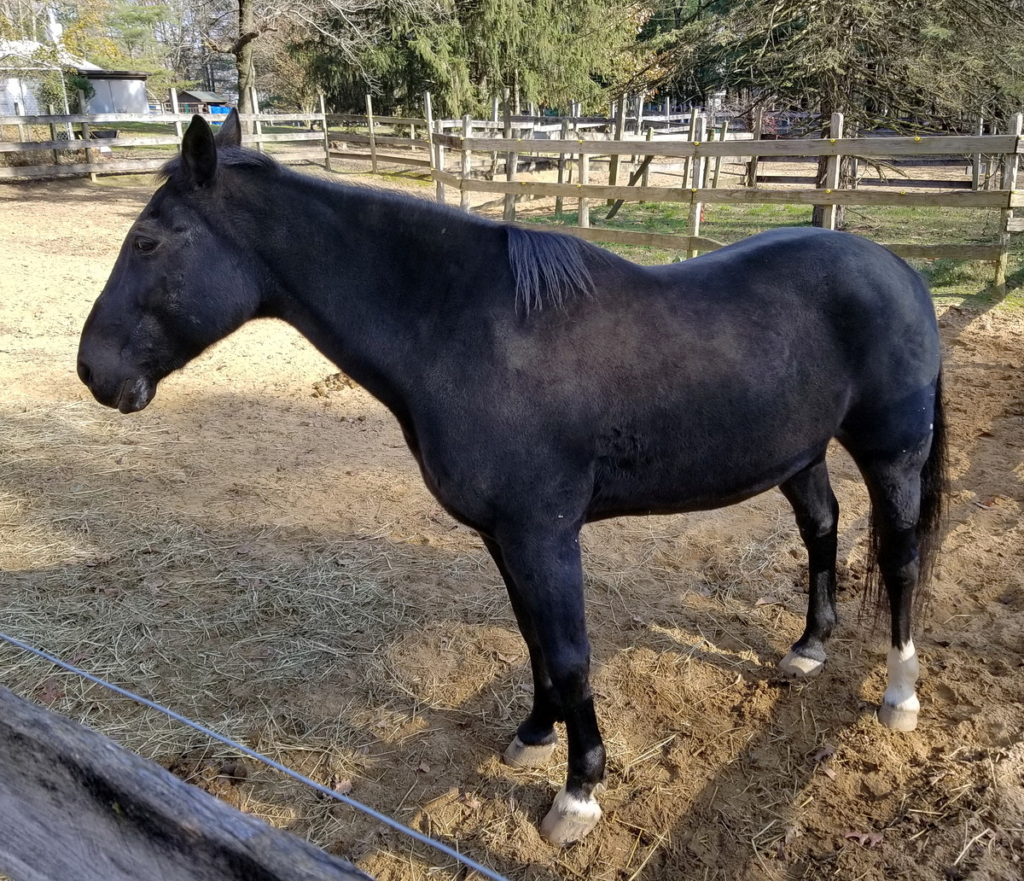
Reed back at home in New Jersey, where he can relax, roll in his paddock and just be a horse again. (Photo by Maggi Romano)
Eventually, he became attached to the Romanos’ racehorse, Wicked Business, so he has a new friend.
And he may be making a public appearance again in 2020.
“I have contacted the local veterans’ group,” she explained, “and Reed might be leading next year’s Memorial Day parade. We hope our plans work out and he will be ridden by one of his handlers from Indiana.”
Whatever happens, he has a home for the rest of his life.

